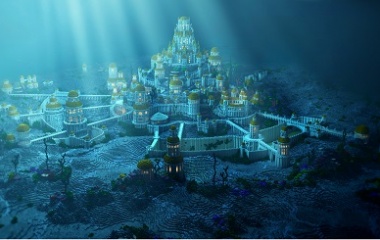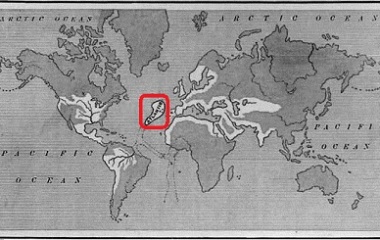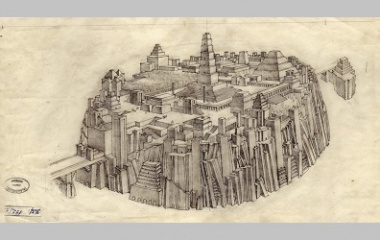An island in the Atlantic Ocean was home to an advanced race of people who were telepathic, telekinetic and even used quantum theory. When the landmass was destroyed by a cataclysmic earthquake, the mysteries of this extraordinary society sunk along with their home, Atlantis.
What Is Atlantis?
Atlantis is a mythological utopian island, inhabited by gods and demi-gods initially. Its location is proposed as being one of many potential sites, including Spain, in the Mediterranean, or possibly even near the poles, hidden under the ice. Atlantis consisted of concentric circles of land and sea, with a central island, which was home to the rulers and extended over 300 miles. The islands had lush vegetation, exotic wildlife and precious metals in abundance.
Plato’s Atlantis
Plato mentions Atlantis, in 330 BC, in two of his dialogues entitled the Timaeus and the Critias. Plato suggested that the mythical civilization existed approximately 9000 years prior to his time. His story expounds on the Atlanteans forming a confederation and trying to gain more power by waging war on neighboring regions. However, the peace-loving, wise people of Athens formed a rebellion and managed to defeat the Atlanteans. Not long after the war, Atlantis sank beneath the sea due to a giant earthquake and possibly a subsequent tsunami.
The earliest history of the island, according to Plato, stretches back to the time of the Greek gods, when Poseidon was in charge of Atlantis. The God of the Sea married a mortal woman called Cleito. Poseidon constructed a home for his new wife on the top of the highest hill on Atlantis’ main island. Cleito bore 10 sons for Poseidon – five sets of twins. The oldest son, Atlas, became king of the islands and he too had many sons. Poseidon had set rules for the people of Atlantis, to maintain a state of harmony. The people needed to adhere to the rules, but after a few generations, they began to pay them less and less heed. By the time the Atlanteans reached the stage of abandoning the gods, the gods decided to take action on the amoral society they had become. Plato’s story of Atlantis ends at that point and is thought to have been an effort to impart his beliefs on society and philosophy to the people.
Santorini
The story of Atlantis may have held some realistic merit, according to Robert Ballard, underwater archeologist and professor of oceanography. A major volcanic eruption destroyed the island of Santorini, near Greece, about 3600 years ago. The island was also believed to be home to an advanced Minoan race at the time. This may give credence to Plato’s account of Atlantis and its destruction.
Modern Resurgence
In 1882, writer Ignatius Donnelly published his work Atlantis: the Antediluvian World, which reignited interest in the mythical island. Donnelly believed advanced civilizations were responsible for bringing modern developments like agriculture, metallurgy and writing to primitive societies and claimed Atlantis was an example of an advanced source, before it was destroyed. In 1888, Madame Blavatsky followed up on Donnelly’s ideas with her work entitled The Secret Doctrine, though she had already mentioned Atlantis in another of her works published in 1877. Blavatsky, occultist and founder of the Theosophy society, believed Atlantis was much larger than originally posited. According to her theory, the history of evolution was divided into different stages or root races. The fourth root race was the Atlantean root race. She further alleged Atlanteans were giants, with Mongolian features. In her view, they were an advanced society that even possessed flying machines. She claimed the destruction of Atlantis commenced when a group on the islands began to practice black magic and became exceedingly materialistic. The practice of black magic continued until Atlantis was destroyed by an earthquake, Blavatsky concluded.
In the early 1930s, Edgar Cayce, a fundamentalist Christian psychic, alleged many of his subjects were Atlanteans in their past lives. He also believed the Atlanteans possessed more advanced technology than we do today. The utopian society used compressed air to power elevators and transport people in tubes, and even employed quantum mechanics! Cayce stated the ancient civilization were able to perform telekinesis and communicate telepathically, too. The Mystery of Atlantis, by author Charles Berlitz, was published in 1969. Berlitz sustained the Atlantean myth and was convinced Atlantis was linked to the Bermuda triangle. His interest in the paranormal extended to claims that extra-terrestrials have visited us on Earth.
An advanced, spiritual and ethical society is often viewed as idealistic or as a mythical utopia today. Through a commonly-held skeptical viewpoint, it is rare that people seek proof of the existence of these mythical cultures or locations, rather choosing to debunk or invalidate their deviation from the norm. At least we still have the power of our own imagination!
Atlantis






No comments:
Post a Comment